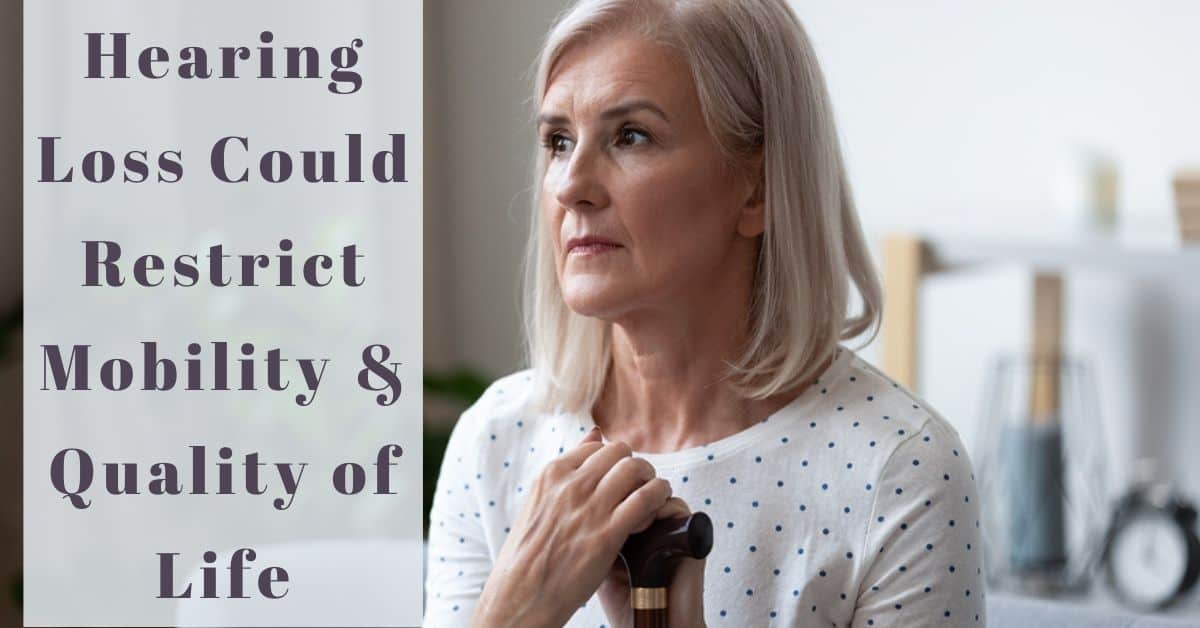Hearing loss has a lot of negative consequences. You know hearing loss makes it more difficult to communicate, and you struggle to follow conversations in crowded coffee shops. However, hearing loss isn’t just about communicating. Recent studies have found that seniors with a hearing loss are far less mobile than their hearing peers. This lowers their overall quality of life, and they risk social isolation, loneliness, and even depression. If you have hearing loss, look after your hearing health as soon as possible to prevent losing your mobility.
How Does Hearing Loss Affect Mobility?
Living with untreated hearing loss affects your ability to pursue your favorite hobbies, engage in the activities you love, or even cross the street safely. Hearing loss can be very limiting, as it robs you of the ability to localize sounds or hear all the sounds around you. Hearing loss makes it difficult to know what’s going on in places with a lot of background noise, and being on a noisy street or in a crowded restaurant can be disorienting and stressful. You may feel unsafe, especially in unfamiliar areas, and you worry that you can’t hear the sounds around you, or hear the honking of a car if you step out to cross the street.
One recent study in Finland asked questions of nearly 900 seniors, and found that those with a hearing loss didn’t leave the house as often, or travel as far, as those with clear hearing. As their hearing loss worsened, these individuals were 50% more likely to stay very close to home, and restrict their mobility. They would stay in familiar areas where they felt safe, and wouldn’t venture too far away from their house or their neighborhood. They felt frustrated that they couldn’t easily navigate through the world and anxious about trying.
Hearing Loss and Communication
When you have hearing loss, communicating becomes especially challenging. You may be able to hear clearly in your own home, or in a quiet place, but understanding what’s been said in a noisy restaurant, on a busy road, or in a transit center, can be almost impossible. These spaces become increasingly difficult to navigate, and those with hearing loss choose to stay home rather than facing the challenge of communicating in these difficult listening environments. Communicating in these settings causes a lot of fatigue and may seem like more trouble than it’s worth, and it soon becomes easier to say home rather than to venture out into a confusing world.
Facing Social Isolation
If you’re ignoring your hearing loss, you’ll soon notice a change in your social life. When you have reduced mobility, and find it scary or uncomfortable to leave the house, you’ll make excuses not to join your friends for dinner, or find a reason to avoid going to the movie theatre with your family. As your mobility declines, you’ll face social isolation, and increase your risk of loneliness, anxiety, and depression.
Hearing Loss Reduces Quality of Life
With limited mobility, fewer chances to engage with the world, and reduced social interactions, it’s no wonder that those with hearing loss have a reduced quality of life. Hearing loss will affect everyone differently, and if you’re a very social person who meets with friends every day, even a minor change in your hearing abilities will come as a big blow to your quality of life. If you often stay home alone, you may not notice your hearing loss at first, or be as affected by the worsening of your hearing.
My Hearing Centers
Hearing loss doesn’t just affect your ears, and if you’re living with untreated hearing loss, you’ll have difficulty communicating, restricted mobility, and a reduced quality of life. Your hearing loss will impact you in profound ways that includes your health and well being.
Have you noticed any recent changes to your hearing abilities? Don’t settle for a reduced quality of life, but visit us at My Hearing Centers to explore the hearing solutions that can give you back your ability to hear, increase your mobility, and improve your overall quality of life. We’ll determine your hearing needs, help you discover your hearing options, and enable you to make the right choice for your hearing and your health.


